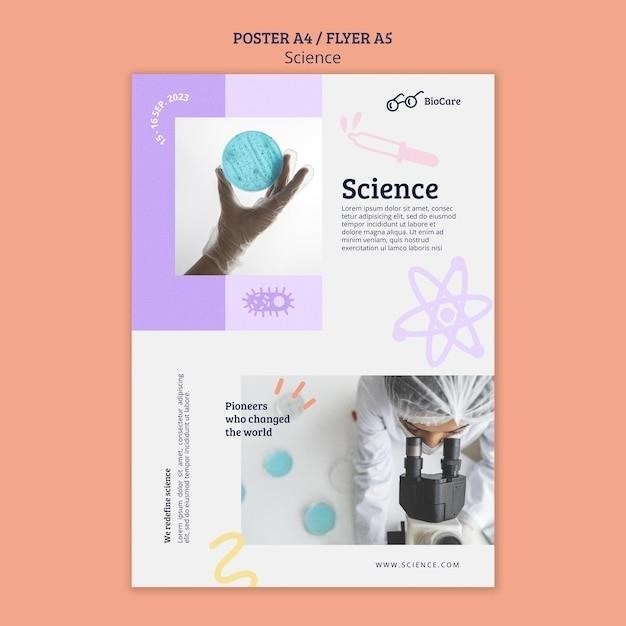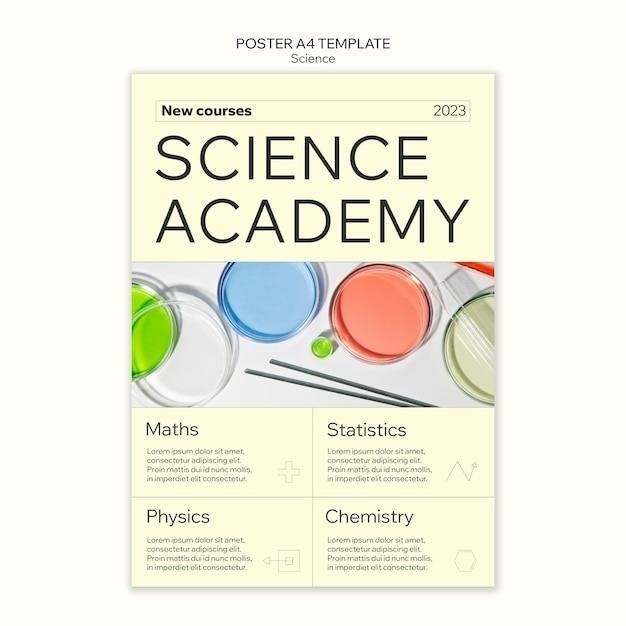Inquiry into Biology Textbook PDFs⁚ A Comprehensive Guide
This guide explores the world of freely available biology textbook PDFs, examining their accessibility, quality, and effective utilization in learning․ We delve into various platforms, resources, and strategies for successful study using digital biology textbooks․
Accessing Free Biology Textbooks Online
The digital age offers unprecedented access to free biology textbooks․ Numerous websites and online platforms host these resources, often in PDF format․ Open Educational Resources (OER) initiatives play a crucial role, providing high-quality, openly licensed textbooks․ These initiatives ensure accessibility and affordability for students worldwide․ Many OER textbooks are created and reviewed by educators, guaranteeing accuracy and relevance to current curricula․ While some platforms may offer direct downloads, others might require online viewing within a browser․ Always verify the license before downloading or distributing a PDF textbook to confirm its legal usage․ The availability of free online textbooks significantly reduces financial barriers to education and democratizes access to biological knowledge․
Open Educational Resources (OER) and Their Advantages
Open Educational Resources (OER) are freely accessible educational materials, often including textbooks available as PDFs․ A significant advantage of OER is their cost-effectiveness; they eliminate the expense of purchasing traditional textbooks, making education more affordable․ Furthermore, OER often feature flexible licenses, allowing for adaptation and modification by educators to better suit their specific teaching needs and student populations․ This adaptability makes OER highly valuable for diverse learning environments․ The open nature of OER promotes collaboration and community involvement in the creation and improvement of educational resources․ Regular updates and revisions are often more easily implemented with OER, ensuring the content remains current and aligned with the latest scientific advancements in biology․
Popular Platforms for Downloading Biology PDFs
Several online platforms serve as repositories for free biology textbook PDFs․ OpenStax, a well-known provider of openly licensed educational materials, offers a comprehensive biology textbook readily available for download․ Many university websites and institutional repositories also host free biology resources, often including lecture notes and supplementary materials in PDF format․ Additionally, websites such as archive․org may contain scanned versions of older textbooks, though the quality and accessibility might vary․ It’s important to carefully evaluate the source and licensing before downloading any material․ Online learning platforms like Coursera and edX sometimes offer free access to course materials, which may include downloadable textbook sections or supplemental PDFs․ Remember to check the terms of use and licensing agreements to ensure legal compliance․
Evaluating the Quality and Reliability of Online Biology Textbooks
Critically assessing the quality of online biology textbooks is crucial․ Look for reputable publishers or educational institutions as sources, suggesting a higher likelihood of accuracy and adherence to scientific standards․ Check for author credentials; established experts in the field lend credibility․ Examine the text for up-to-date information; outdated content renders the textbook unreliable․ A well-structured textbook with clear explanations, appropriate visuals, and a comprehensive index enhances its value․ Consider user reviews and feedback to gauge the overall experience and identify potential flaws․ Compare the content against established biology curricula to determine completeness․ The presence of citations and a bibliography shows a commitment to academic rigor․ Beware of textbooks with numerous errors or biased information; accuracy is paramount in scientific learning․

Specific Biology Textbook PDFs⁚ A Closer Look
This section provides detailed reviews of popular freely available biology textbooks in PDF format, highlighting their strengths and weaknesses for students․
Campbell Biology⁚ A Widely Used Introductory Text
Campbell Biology, a leading introductory biology textbook, enjoys widespread use in colleges and universities․ Its reputation rests on accuracy, currency, and a clear commitment to effective teaching and learning․ While not freely available as a PDF in its entirety (though excerpts and older editions might be found online), its enduring popularity stems from its comprehensive coverage of fundamental biological principles․ The text presents complex concepts accessibly, enhanced by illustrations and real-world examples that make learning engaging․ Students often praise its clarity and logical structure, making it an invaluable resource for mastering introductory biology․ However, the cost of purchasing the official text can be a barrier for some students, leading to a search for alternative, potentially less reliable online resources․
OpenStax Biology⁚ A Free and Comprehensive Resource
OpenStax Biology stands out as a completely free and comprehensive online biology textbook, readily available as a PDF download․ This open educational resource (OER) offers a significant advantage to students, eliminating the financial burden of traditional textbooks․ The content is meticulously crafted, regularly updated to reflect current scientific understanding, and structured to meet the needs of introductory biology courses․ OpenStax provides accompanying online resources, including study guides and interactive exercises, to enhance the learning experience․ The text’s accessibility and high-quality content make it a valuable asset for students seeking affordable and reliable biology education․ Its open license allows educators to adapt and share the material, further promoting its widespread use and accessibility․
Other Notable Free Biology Textbooks and Resources
Beyond OpenStax, a wealth of free biology textbooks and resources exists online․ Many universities and institutions offer open educational resources (OER), including complete textbooks and individual chapters available as PDFs․ These materials often cover a wide range of biological topics, from introductory concepts to specialized areas․ Platforms like the Internet Archive host collections of digitized biology textbooks, offering access to both classic and contemporary works․ Additionally, numerous websites and online learning platforms provide free biology lectures, study guides, and interactive simulations, supplementing textbook learning․ Remember to critically evaluate the source and author credentials before utilizing any online resource to ensure accuracy and reliability of information; Exploring these diverse options can provide students with a rich and comprehensive learning experience․

Utilizing Biology Textbook PDFs Effectively
Mastering digital biology textbooks requires strategic navigation and supplementary resources․ Effective study plans, leveraging online tools, are crucial for maximizing comprehension and retention․
Tips for Efficient PDF Textbook Navigation and Study
Efficiently navigating and studying biology textbook PDFs involves leveraging the digital format’s features․ Utilize the search function to quickly locate specific terms or concepts․ Take advantage of bookmarks and annotations to highlight key information, create personalized notes, and mark passages for review․ Many PDF readers allow you to adjust text size and font for optimal readability, reducing eye strain during extended study sessions․ Consider using a stylus or digital pen for annotations, mimicking the experience of writing in a physical textbook․ Organize your digital notes and annotations using a consistent system to facilitate easy retrieval and review․ Regularly review your marked sections and notes to reinforce learning and identify areas needing further clarification․ Explore the PDF’s table of contents and index for efficient chapter navigation and topic location․ Experiment with different reading techniques, such as active recall or spaced repetition, to enhance knowledge retention․ Remember that effective use of digital tools can significantly enhance the learning experience․
Supplementing PDF Textbooks with Online Resources
While PDF textbooks provide a comprehensive foundation, supplementing them with online resources significantly enhances the learning experience․ Explore interactive simulations and animations to visualize complex biological processes․ Utilize online video lectures and tutorials to gain diverse perspectives and clarify challenging concepts․ Engage with online quizzes and practice questions to assess your understanding and identify areas needing further review․ Access reputable online encyclopedias and databases, such as Wikipedia or PubMed, to delve deeper into specific topics or research current advancements․ Join online forums or study groups to collaborate with peers, share insights, and address any questions or uncertainties․ Consider utilizing online flashcards or spaced repetition software to reinforce memorization of key terms and definitions․ Explore interactive 3D models and virtual labs to experience hands-on learning without physical limitations․ Remember to evaluate the credibility and accuracy of online sources before integrating them into your studies, ensuring they align with your textbook’s content and learning objectives․
Creating a Personalized Study Plan with Your Chosen PDF Textbook
To maximize your learning from a chosen biology PDF textbook, crafting a personalized study plan is crucial․ Begin by assessing your current knowledge and identifying areas requiring more focus․ Break down the textbook’s content into manageable chunks, allocating specific time slots for each chapter or section․ Incorporate diverse study techniques, such as active recall, summarizing key concepts, and creating diagrams or mind maps․ Schedule regular breaks to avoid burnout and maintain focus․ Incorporate practice problems and quizzes to reinforce learning and identify knowledge gaps․ Consider using a planner or digital calendar to track your progress and stay organized․ Adjust your study schedule as needed, based on your learning pace and understanding of the material․ Don’t hesitate to seek clarification on challenging concepts through online resources or study groups․ Regularly review previously covered material to reinforce long-term retention․ Celebrate your achievements and milestones to stay motivated throughout your study journey․ Remember, consistency and adaptability are key to success․


